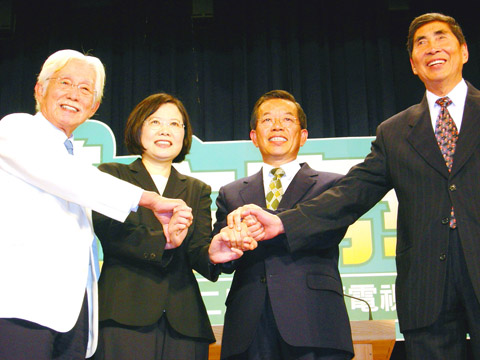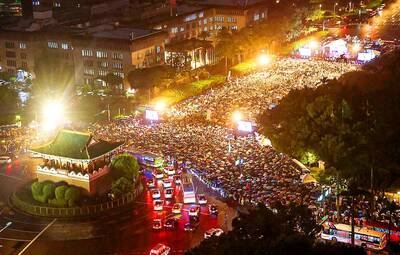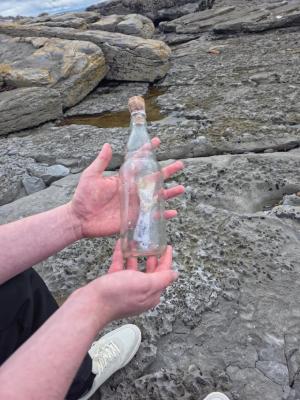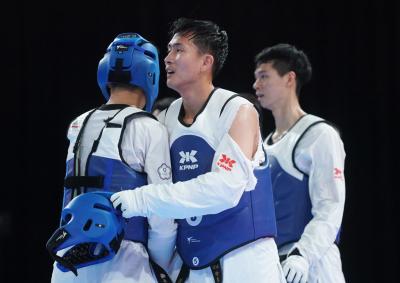The three contenders for the Democratic Progressive Party’s (DPP) top post sparred over the issues of the party’s future direction, cross-strait relations and regaining public trust in a televised debate yesterday.
While DPP Legislator Chai Trong-rong (蔡同榮),73, and former presidential senior adviser Koo Kwang-ming (辜寬敏), 82, emphasized the party’s roles in advocating Taiwanese independence, former vice premier Tsai Ing-wen (蔡英文), 52, highlighted the importance of expanding the party’s support base.
The 22-year-old party’s eight-year rule as a governing party is coming to an end on May 20, when it hands over the power to the Chinese Nationalist Party (KMT).

PHOTO: CNA
The DPP came to power in 2000, marking the country’s first power transfer and ending more than 50 years of KMT rule. The DPP won another four years in office with its victory in the 2004 presidential election, winning a record-high 50.11 percent of the vote.
However, the party started experiencing setbacks in 2005. It suffered defeat in local government elections, the Taipei city mayoral and city councilor elections in 2006, the legislative election earlier this year — in which it secured only a handful of seats — and the bruising defeat in the presidential election this March.
The party’s image has also been tarnished by a series of scandals involving members of the first family and several government officials. Political observers say that the political gridlock, a lackluster economy and the cross-strait stalemate all contributed to tarnishing the party’s public image.
The debate, the only one before the chairmanship election next Sunday, was held in Kaohsiung City and was televised nationwide by Formosa TV.
Koo and Chai spoke mostly in Hoklo during the debate, while Tsai spoke in Mandarin most of the time.
Tsai said the DPP should have more interaction with the middle-class, women and young groups “to lure them to work with us.”
Tsai said that one reason some DPP officials got caught up in corruption allegations was that they fell victim to the rotten system of government that the DPP inherited from the KMT’s long-term rule.
The system will get worse after the KMT returns to power, she added.
Koo, the oldest candidate of the three, tried to turn his age from a liability into an asset.
“An old man like me has already come forward, can young people bear to abandon the DPP?” Koo asked.
Koo said he felt grief when the KMT won the legislative election in January and the presidential election in March, as it seemed to be a public repudiation of Taiwanese independence that he had advocated for so many decades.
Chai urged party members to vote for him as he is experienced and can mobilize support to protest against the KMT administration if president-elect Ma Ying-jeou (馬英九) and the legislature were to pass a cross-strait peace agreement as Ma had promised during his presidential campaign.
The peace agreement would rule out the option for Taiwanese to pursue independence and prohibit Taiwan from purchasing weapons for self-defense, Chai said.
“Ma had said that the peace agreement is subject to legislative approval only and does not need public support. If he were to make such a move, the DPP needs a chairman who can lead a mass demonstration,” Chai said
In a question-and-answer session, the three candidates elaborated on their ideas on the new challenges that the DPP was facing, including China’s rise, an absolute KMT majority and a China-friendly KMT government. They also discussed how the DPP could broaden its support to win in the next presidential election.
Chai said he wasn’t concerned about the KMT majority in the legislature.
“We don’t have many legislators — only 27, but it’s much more than the number of people we had in the legislature 20 years ago,” he said. “So these 27 comrades should work hard to keep tabs on the KMT.”
He said the DPP should focus more on defending Taiwan’s sovereignty and work with all anti-KMT groups and individuals.
“I’m very experienced in the struggle against the KMT,” he said. “Before we won [in 2000], I used to collaborate with many groups to organize demonstrations against the KMT government — one time, we had more than 200,000 participants and I was the chief convener of the demonstration.”
“What’s more important is that we should insist on safeguarding Taiwan’s sovereignty and independence — it’s the DPP’s core value, it’s the DPP’s soul. The party will collapse if we don’t persevere,” Chai said.
Koo agreed.
“I have some figures here that show 89.3 percent of the people think that Taiwan and China are separate countries, and that 81 percent of the people are against unification [with China],” Koo told the audience. “Although the KMT — with unification as its ultimate goal — now has the power, its political ideology is different from what most people believe in, and therefore I don’t think they will be in power for long.”
Koo went on to say that the DPP had lost power not because of its stance on Taiwan’s sovereignty, but rather because DPP politicians had failed to stick to this ideology.
Tsai also said she believed the nation’s sovereignty could not be sacrificed in exchange for closer cross-strait ties.
“During my term as chairperson of the Mainland Affairs Council, I never made any concessions on Taiwan’s sovereignty, and yet, direct ferry lines [between Kinmen, Matsu and China], and direct cross-strait holiday charter flights were successfully launched during my term,” she said.
She also stressed that any changes to the nation’s status quo must be decided by a referendum.
“That’s the bottom line, and we cannot back down,” she said.
However, instead of focusing solely on defending Taiwan’s sovereignty, she said the DPP should also be more open to broadening its support.
“Taiwan is a migrant society, different groups of people moved to this island at different times, and they have different ideas and emotional ties to China,” Tsai said. “We should therefore find a common ground that is acceptable to everyone.”
“We put ourselves in other people’s shoes and explain our ideas to them in their language,” she said.
The three were also asked about the country’s economic performance under the DPP government.
All three said that the economy under the DPP was not as bad as the media had portrayed.
“I don’t only think that the economy isn’t bad, I actually think it’s quite good,” Koo said. “But there are pro-blue media outlets that keep reporting otherwise — it’s quite irresponsible.”
Koo and Tsai also emphasized the need for better government communication with the public to present a clearer image of what the administration had achieved.
In conclusion, Tsai said she would work to build a DPP as a grassroots, transparent, efficient, tolerant, diverse and united party.
Chai said that the DPP should stand firm on keeping Taiwan sovereign and independent, while adding that the party should solidify its grassroots organizations.
Koo said he would work to stabilize the party and to strengthen the connection between the party and its supporters.

FINAL COUNTDOWN: About 50,000 attended a pro-recall rally yesterday, while the KMT and the TPP plan to rally against the recall votes today Democracy activists, together with arts and education representatives, yesterday organized a motorcade, while thousands gathered on Ketagalan Boulevard in Taipei in the evening in support of tomorrow’s recall votes. Recall votes for 24 Chinese Nationalist Party (KMT) lawmakers and suspended Hsinchu City mayor Ann Kao (高虹安) are to be held tomorrow, while recall votes for seven other KMT lawmakers are scheduled for Aug. 23. The afternoon motorcade was led by the Spring Breeze Culture and Arts Foundation, the Tyzen Hsiao Foundation and the Friends of Lee Teng-hui Association, and was joined by delegates from the Taiwan Statebuilding Party and the Taiwan Solidarity

Instead of threatening tariffs on Taiwan-made chips, the US should try to reinforce cooperation with Taiwan on semiconductor development to take on challenges from the People’s Republic of China (PRC), a Taiwanese think tank said. The administration of US President Donald Trump has threatened to impose across-the-board import duties of 32 percent on Taiwan-made goods and levy a separate tariff on semiconductors, which Taiwan is hoping to avoid. The Research Institute for Democracy, Society, and Emerging Technology (DSET), a National Science and Technology Council think tank, said that US efforts should focus on containing China’s semiconductor rise rather than impairing Taiwan. “Without

An SOS message in a bottle has been found in Ireland that is believed to have come from the Taiwanese captain of fishing vessel Yong Yu Sing No. 18 (永裕興18號), who has been missing without a trace for over four years, along with nine Indonesian crew members. The vessel, registered to Suao (蘇澳), went missing near Hawaii on Dec. 30, 2020. The ship has since been recovered, but the 10 crew members have never been found. The captain, surnamed Lee (李), is believed to have signed the note with his name. A post appeared on Reddit on Tuesday after a man

President William Lai (賴清德) today condemned an alleged attempt by two Chinese to snatch a letter of congratulations handed to Taiwan’s taekwondo team after they won silver at the Summer World University Games in Essen, Germany, yesterday. A Chinese man and woman reportedly tried to snatch a congratulatory letter to athletes Hung Jiun-yi (洪俊義), Jung Jiun-jie (鍾俊傑) and Huang Cho-cheng (黃卓乘) from the Ministry of Education, and then argued with media employees. “Why are you taking our things?” the media employees asked. “Does that say Chinese Taipei?” the two Chinese reportedly said. Following the incident, Sports Administration Director-General Cheng Shih-chung (鄭世忠) wrote on